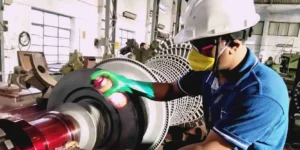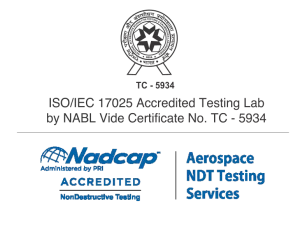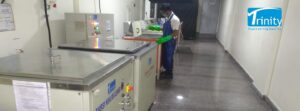Dye Penetrant DPT Testing Services. NABL Accredited Lab.
Fluorescent, visible Techniques. Onsite and In lab Services. Experts in Weld DPT Testing.
Dye Penetrant Testing (DPT) testing Services Lab. NABL Accredited NDT Center in Bangalore. onsite Weld LPI Inspections since 2001.
We are the NABL Accredited Dye Penetrant Testing (DPT) Lab serving from Peenya Industrial Area in Bangalore. ISO17025 Approved in the state of Karnataka for in-house and onsite inspections. Experience the speed and reliability with Trinity NDT. Trusted third party inspection company for over 1500+ customers in India. Special team of ASNT Level II, III and ISO9712 certified inspectors. Capable to perform DPT of welds, chimney at higher altitudes and pipelines.
Dye Penetrant Testing is also widely known as DPT testing or LPI inspection. In aerospace sector the same is called as Fluorescent Penetrant Inspection (FPI testing). It is a Non-destructive Evaluation (NDE) method for finding flaws in welds and castings. Objective of the method is finding surface opened flaws. Can be applied for manufacturing and in-service inspections.
In general, this is one of the prominent method for quality testing of even Forgings, machined components. Of all the NDT methods, it is the cheapest one. Not much training and high end equipment are needed to perform DPT testing. All that is needed is a cleaner, penetrant and developer with a hand full of lint free cloth.
Also, Penetrant inspection a reliable method for testing Aerospace hardware. Aircraft structures are routinely tested during MRO inspections to find fatigue cracks. Our Labs are specially equipped with NADCAP accredited FPI testing.
Trinity NDT – DPT testing centre has range of penetrants to serve various clients. Whether it is visible red dye penetrant or fluorescent penetrant, we have solutions to meet your demands. You may bring the parts to our NDT Labs or you may invite us to do onsite testing at your works.
To serve customers better, we have in-house ASNT NDT Level III consulting experts. Aerospace customers are served by in-house NAS410 Level III and Level II inspectors. Best part of the facility is each DPT testing techniques has reserved spacious labs. NDT procedures are duly approved. Another noted speciality of our service is fast response to calls. Today we cater to over 1500+ reputed companies.
Penetrant Types, Techniques and Sensitivities.
The Best DPT testing Service Lab in Bangalore.

Though DPT testing is the simplest NDT method, test results may vary greatly in terms of techniques and sensitivity levels. Examination Results may be poor if improper technique or procedures are followed. To maintain consistency in obtaining results, only approved NDT procedures shall be followed by all the inspectors.
In Penetrant testing, as per ASMT E165, there are two types of penetrants,
Type 1 (Fluorescent)
Type 2 (Visible).
Penetrants are then classified based on the method used to remove excess penetrant from the part. The four methods are
- Method A – Water Washable
- Method B – Post Emulsifiable (Lipophilic)
- Method C – Solvent Removable
- Method D – Post Emulsifiable (Hydrophilic)
Fluorescent penetrants are further defined by a sensitivity level category. The sensitivity of a penetrant is related to the brightness of an indication when measured with a photometer and compared to a standard. There are Five Levels of sensitivity for fluorescent dyes:
- Level ½ – Ultralow
- Level 1 – Low
- Level 2 – Medium
- Level 3 – High and
- Level 4 – Ultra High
At our DPT test labs in Bangalore, we have facility for all types of penetrants and sensitivities.
DPT testing is not as simple as one think. To get proper results, it should be performed using right chemicals, procedures, experienced of Level II inspectors and a lot more. Not everything you see at welding shops is a right procedure. To get accurate results, outsource your DPT testing to Trinity NDT. We deliver perfect examination results. Our Labs are accredited to NABL and NADCAP Aerospace.
Steps in DPT testing
DPT has simple steps,
- Pre-cleaning
- Applying penetrant
- Penetrant Dwell time
- Excess penetrant removal
- Drying the surface/s
- Developer Application
- Developing time
- Interpretation of indications
- Evaluate and record
- Post cleaning
- Apply rust preventive oil
Dry Developers are preferred for Aerospace NDT applications. At our DPT testing labs, Solvent removable, Wet Aqueous and Non-aqueous developers also available. Selection of penetrants, sensitivities, developers is based on end user requirements.
an NABL Accredited Lab for Penetrant Testing

Our DPT test labs at Bangalore are NABL ISO17025 accredited for in-house and onsite inspections. Our systems meet international standards such as ASTM E165. Facility for aerospace FPI testing as per standard ASTM E 1417. Inspectors are trained to follow customer specific Standard Operating procedures (SOPs).
Type 1, 2, Water washable, Post Emulsifiable, Solvent removable penetrants and sensitivity up to Level 4 are available. Quick Contact us for your requirements on DPT testing.
Penetrant testing Using Stationery Equipment

Stationery Penetrant Inspection line is catering to the needs of customers in both general and aerospace. Considered as one of the best DPT facility at Bangalore in India. Pre-cleaning techniques: Ultrasonic Cleaning, Alkaline cleaning and solvent cleaning solutions. Parts up to 600mm in size are tested. Special zone for red penetrant inspection of smaller parts. A 5 Ton EOT crane is available for handling bigger parts.
Inspectors who perform DPT testing are certified to ASNT Level II, ISO9712 and NAS410. An in-house ASNT Level III for approving procedures and techniques. NDT Level IIs have over 20 years of experience in performing the inspections. Skill levels of technicians are high.
As a third party, Trinity NDT undertakes Dye penetrant testing at both onsite and off-site. Served sectors including Welds, Pressure vessels, boiler parts, cross country pipe lines, Castings, Valves, gears, Turbine blades. The Objective of DPT is to find surface exposed cracks, porosity, lack of fusion and blow holes. Timely calibrations, daily control checks using TAM/PSM panels ensures the process controls are intact.
Our Aerospace FPI testing labs are approved by CEMILAC – DRDO organization – Government of India, Hindustan Aeronautics Ltd – HAL, L & T Aerospace and many more. Contact us today, to outsource your DPT Testing to us. We assure to deliver the best to meet your expectations in terms of on-time delivery at affordable cost.
ASNT Level III Consulting Service - Penetrant testing
We have the highly qualified in-house Penetrant Testing ASNT & NAS401 Level III professionals. Every NDT procedure we follow is duly approved by the company Level III. We also provide NDT consulting to prepare Written Practice, establish techniques and setting up DPT facility.
They are certified to ASNT Level III and NAS410 for aerospace with over 25+ years experience. Also certify NDT personnel with us on DPT Testing Level II at our training and certification courses. Our training division, Trinity Institute of NDT technology offers courses as per SNT TC 1A and ISO9712.
Equipment and Consumable for Sales. Dealers and Stockists in Bangalore for DPT Chemicals.
We also supply Penetrants, Red and fluorescent chemicals kits. Trinity NDT is dealer and stockist in the state of Karnataka for Ferrochem make MPT and DPT consumables. We sell DPT testing kits in Bangalore that consists of penetrants, cleaners and developers. Maintain stocks at our facility in Peenya, Bangalore.
Also, stockists and dealer in Bangalore for MR Chemicals and Vector make Crackchek branded penetrant testing consumables. Supplies accessories such as aluminium cracked comparator blocks for DPT system checks. Stationery equipments can also be supplied. Test Kits can be hand picked from our office or couriered to your address anywhere in India. Easy access for customers in Hosur and Mysore stocked at Peenya Industrial Area, Bangalore.
Cost of DPT Chemical kit starts at Rs750/- + GST in Bangalore. Contact Trinity NDT – Sales Manager in Peenya today.
Quick Contact us for your requirements on PT chemicals sales
Knowledge Corner - Learn basics
Understanding the basics of Penetrant Testing - A comprehensive guide
Penetrant testing, also known as dye penetrant inspection (DPI) or liquid penetrant inspection (LPI), is a widely used method of non-destructive testing (NDT) to detect cracks, surface breaks, and other defects in various materials. This guide aims to provide a comprehensive understanding of the basics of penetrant testing, including the process, types, and applications.
The Process of Penetrant Testing
- Preparation: Before starting the penetrant testing process, it’s crucial to prepare the test object. This involves:
- Cleaning the surface: This is to ensure that no dirt, grease, or any other contaminants are present that could potentially affect the results.
- Checking the surface: This is to identify any visible defects or anomalies.
- Application of Penetrant: Once the surface is clean and checked, the penetrant is applied. This can be done using various methods such as spraying, brushing, or immersing the object in the penetrant. The penetrant is typically a bright, fluorescent color to make the defects more visible.
- Removal of Excess Penetrant: After the penetrant has been given sufficient time to seep into any defects, the excess is removed. This can be done using a solvent or by dry wiping, depending on the type of penetrant used.
- Application of Developer: The final step in the process is the application of a developer. This helps to draw the penetrant out of any defects and spread it over the surface, making it easier to see under UV light.
Types of Penetrant Testing
There are several types of penetrant testing, each with its own unique properties and applications. These include:
- Water-washable: This type of penetrant testing is easy to remove with water and is commonly used for large, non-porous components.
- Post-emulsifiable: This requires an emulsifier to be applied before the excess penetrant can be removed. It provides more sensitivity than water-washable penetrants.
- Solvent-removable: This type of penetrant is removed using a solvent. It’s typically used for small, intricate parts where water washing isn’t practical.
Applications
Penetrant testing is used in a wide range of industries and applications, including:
- Aerospace: To detect surface defects in aircraft components.
- Automotive: To check for cracks in engine components.
- Construction: To inspect welds on steel structures.
- Power generation: To identify defects in turbine blades.
In conclusion, penetrant testing is a highly versatile and effective method of non-destructive testing. By understanding the basics, you can better appreciate its value and potential applications in various industries.
Codes and Standards for DPT testing
Even though there are numerous standards on PT testing, ASTM standards ASTM E 165 and ASTM E 1417 are widely recognized. Apart from this, ASME pressure vessel code ASME Section V, API Codes, AWS codes, British Standards, EN standards provide acceptance criteria.
Trinity NDT – Testing Labs uses its ASNT and NAS410 Level III approved DP test procedures that meets international standards, codes and customer specifications.
Key Highlights of facility
- Stationery penetrant inspection equipments
- S2, S3 & S4 sensitivity
- UV lights
- Professionals are qualified and certified to PT Level I, II as per Written Practice framed to the requirements of SNT-TC-1A, NAS410 & ISO9712
- Experienced in house ASNT NDT Level III consultants
- NDT Level III trainers for conducting NDT Level 1, 2 training and certification courses on Liquid penetrant testing.
- Skilled NDT Level 2 certified inspectors
- Sales and Supply of Dye penetrant inspection (DPT), penetrants, cleaners, solvents, developers
Training and Certification programs on Penetrant testing
Trinity Institute of NDT Technology (A training division of Trinity NDT) offers world class NDT training and certification courses that meets written practice and framed to the requirements of SNT TC 1A. Learn penetrant testing procedures at our upcoming DPT inspection Level II course. For the next schedule, visit Training Calendar page. Know about fee structure, eligibility criteria for the training courses and register online for the NDT Level II courses.
Participants from over 40 countries have benefited from DPT Level II courses offered as per ASNT SNT TC 1A and ISO9712. Read reviews on Youtube channel

